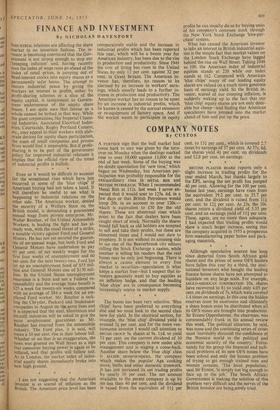FINANCE AND INVESTMENT
By NICHOLAS
DAVENPORT
Even so it would be difficult to account for the sensational rises which have just occurred in some of the 'blue chips' if American buying had not taken a hand. It Will therefore be useful to see what is happening to industrial relations on the other side. The American worker, denied the security of a Welfare State on the British model, is demanding a guaranteed annual wage from private enterprise. Mr. Walter Reuther, of the United Automobile Workers, is leading the fight and has al, ready won, with the usual threat of a strike, a notable victory against Ford and General Motors. He has not yet secured the guaran- tee of atrannual wage, but both Ford and General Motors have undertaken to pay (5 per cent. of net weekly wages for the lirst four weeks of unemployment and 60 Per cent. for the next twenty-two. Ford has set up an unemployment fund. of $55 mil- lion and General Motors one of $150 mil- lion. In the United States unemployment insurance is a State and not a Federal re-
sponsibility and the average State benefit is $25 a week for twenty-six weeks, compared
with an average of $84 a week for an em- Ployed Ford worker. Mr. Reuther is tack- ling the Chrysler, Packard and Studebaker companies in August on the same lines and It is expected that the steel, aluminium and aircraft industries will be asked to give the same employment guarantees as Mr. Reuther has exacted from the automobile industry. The Ford plan, it is said, will mean a 10 per cent. rise in their labour bill. Whether or no that is an exaggeration, the news was greeted on Wall Street as a sign that consumer buying power is again to be inflated, and that profits will follow suit. As in London, the market index of indus- trial equity shares immediately broke into new high ground.
comparatively stable and the increase in industrial profits which has been reported this year, which will be a boom year for American industry, has been due to the rise in production and productivity. Since 1949 the cost of living has risen in the United States by only 12 per cent. against 32 per cent. in Great Britain. The American in- vestor has, therefore, no reason to be alarmed by an increase in workers' earn- ings, which usually leads to a further in- crease in production and productivity. The American worker has no reason to be upset by an increase in industrial profits, which he knows is caused by the normal extension or re-equipment of factory space. And if the worker wants to participate in equity
profits he can usually do so by buying units of his company's common stock through the New York Stock Exchange 'hire-pur- chase' system.
What has caused the American investor to take an interest in British industrial equi- ties is the simple fact that market values on the London Stock Exchange have lagged behind the rise on Wall Street. Taking 1948 as 100, the American index of industrial equities stands at 23.8 while our index stands at 162. Compared with American• 'blue chips' many of our leading equity shares are valued on a much more generous basis of earnings yield. So the British in- vestor, scared of our creeping inflation, is suddenly waking up to the fact that our 'blue chip' equity shares are not only desir- able but cheap—and finding that American speculators have jumped into the market ahead of him and put up the price.

















































 Previous page
Previous page